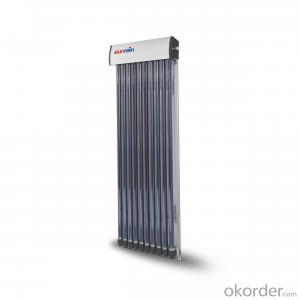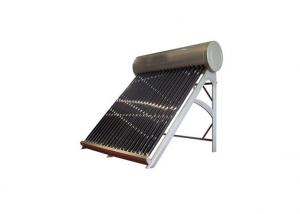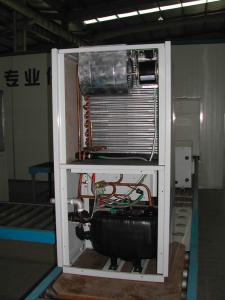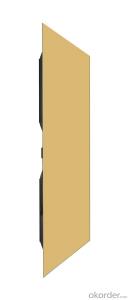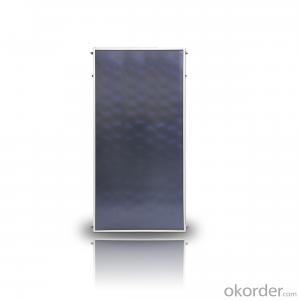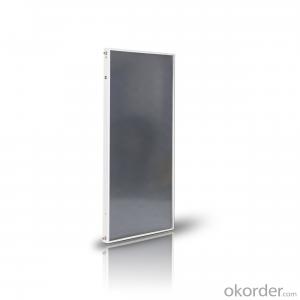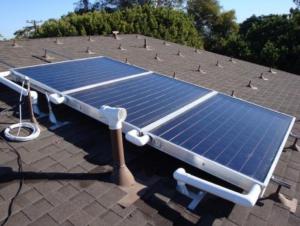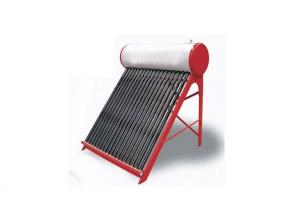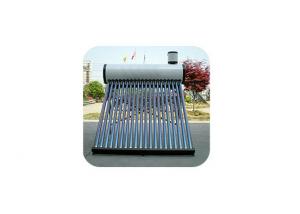CPC Collector
- Loading Port:
- China Main Port
- Payment Terms:
- TT OR LC
- Min Order Qty:
- -
- Supply Capability:
- -
OKorder Service Pledge
OKorder Financial Service
You Might Also Like
*Excellent performance evacuated tube collectors
* Can be mounted free-standing or on a pitched roof, easy to install, simple roof fixings
* Integrated into building perfectly, any angle installation
* U pipe - offer low maintenance
* No water in the vacuum tubes, no freezing problem in winter, can be used in cold area. It can be still operate in the event of occasional tube breakages.
* 3 years warranty, 20+ years lifespan
* Market leading efficiency/output
* Triple layer selective absorber coating, absorption coefficient >94%
* Evacuated tube outer tube thickness >1.8mm
* Aluminum frame, strong structure, light weight.
* High and constant pressure of polyurethane foaming technology ensure the outstanding insulation quality.
- Q:What is the difference between a flat plate and evacuated tube collector in a solar water heater?
- A flat plate collector and an evacuated tube collector are two different types of solar water heaters, each with its own advantages and disadvantages. A flat plate collector consists of a flat, rectangular box with a transparent cover, usually made of glass, and a dark-colored absorber plate inside. The plate absorbs the sunlight and transfers the heat to a fluid (usually water or a mixture of water and antifreeze) that circulates through the collector. The fluid then carries the heat to a storage tank or directly to the desired application. On the other hand, an evacuated tube collector consists of a series of parallel glass tubes, each containing a metal absorber tube. The air is removed from the space between the two tubes, creating a vacuum, which helps to minimize heat loss. The absorber tube absorbs the sunlight and transfers the heat to the fluid that flows through it. One of the main differences between the two collectors is their efficiency. Evacuated tube collectors are generally more efficient than flat plate collectors, especially in colder climates or during cloudy days. The vacuum insulation in evacuated tubes reduces heat loss, allowing them to collect more solar energy even in less favorable conditions. Another difference is their resistance to overheating. Flat plate collectors can sometimes overheat in hot climates or during summer months, which can reduce their efficiency and even damage the system. On the other hand, evacuated tube collectors have a higher tolerance for high temperatures, making them more suitable for areas with intense sunlight or during peak summer conditions. In terms of cost, flat plate collectors are usually less expensive than evacuated tube collectors. The manufacturing process of flat plate collectors is simpler and requires fewer materials. However, the higher efficiency and durability of evacuated tube collectors can offset their initial cost over time, as they tend to have a longer lifespan and lower maintenance requirements. Overall, the choice between a flat plate collector and an evacuated tube collector depends on various factors such as climate, budget, available space, and desired performance. It is important to evaluate these factors carefully to determine which type of solar water heater is the most suitable for a specific application or location.
- Q:The building is the slope roof, above is the tile, may install the solar energy water heater
- Slope roof can be installed solar water heater.The utility model relates to a solar water heater, which is a device for converting solar energy into heat energy, which is used for heating water from low temperature to high temperature, so as to meet the requirement of hot water use in people's life and production
- Q:How does the size of a storage tank affect the performance of a solar water heater?
- The size of a storage tank can directly affect the performance of a solar water heater. A larger storage tank allows for more hot water to be stored, providing a greater supply of hot water for longer durations. On the other hand, a smaller storage tank may result in limited hot water availability, especially during periods of high demand. Therefore, choosing an appropriate size for the storage tank is crucial in ensuring efficient and satisfactory performance of a solar water heater.
- Q:How does the cost of a solar water heater compare to a traditional water heating system?
- The cost of a solar water heater is typically higher upfront compared to a traditional water heating system. However, in the long run, a solar water heater can save a significant amount of money on energy bills due to its reliance on solar energy, making it a more cost-effective option over time.
- Q:Are there any government incentives available for installing a solar water heater?
- Yes, there are government incentives available for installing a solar water heater. These incentives vary depending on the country and region, but they often include tax credits, grants, and rebate programs. It is advisable to check with your local government or energy authority to determine the specific incentives available in your area.
- Q:Can a solar water heater work during cloudy days?
- Yes, a solar water heater can still work during cloudy days. While sunlight is the primary source of energy for solar water heaters, they can still generate heat using diffused or indirect sunlight. However, the efficiency and amount of heat produced may be reduced compared to sunny days.
- Q:Can a solar water heater be used in areas with high levels of air pollution from power plants?
- Yes, a solar water heater can still be used in areas with high levels of air pollution from power plants. The efficiency and performance of the solar water heater may be slightly affected due to the reduced sunlight reaching the solar panels. Regular cleaning and maintenance of the panels may be required to ensure optimal functioning. However, in the long run, using a solar water heater can help reduce reliance on fossil fuels and contribute to mitigating air pollution caused by power plants.
- Q:What is the lifespan of the solar panels used in a solar water heater?
- The lifespan of solar panels used in a solar water heater can vary, but on average, they can last for 20 to 25 years.
- Q:How does a solar water heater affect water temperature consistency?
- A solar water heater helps maintain a more consistent water temperature by utilizing the sun's energy to heat the water. This renewable energy source ensures a steady supply of warm water throughout the day, reducing fluctuations in temperature compared to traditional water heaters that rely on electricity or gas.
- Q:How does the insulation of the storage tank affect the efficiency of a solar water heater?
- The efficiency of a solar water heater greatly depends on the insulation of its storage tank. Insulation plays a vital role in minimizing heat loss from the stored water, allowing it to retain heat for longer durations. Consequently, this reduces the need for constant heating and enhances the overall energy efficiency of the entire system. When the storage tank is adequately insulated, it effectively maintains the desired water temperature for extended periods, even during times of low solar radiation or at night. This means that the solar water heater can continuously provide hot water without relying on additional energy sources, such as electricity or gas, for heating purposes. Conversely, insufficient insulation in the storage tank results in rapid heat loss and a significant drop in water temperature over time. As a result, the solar water heater needs to work harder and for longer durations to reheat the water to the desired temperature, leading to increased energy consumption. Additionally, frequent heating cycles can strain the system, potentially reducing its lifespan and incurring higher maintenance costs. In conclusion, a well-insulated storage tank is crucial for maximizing the efficiency of a solar water heater. It minimizes energy wastage by reducing heat loss and ensures a consistent supply of hot water, even during periods of low solar radiation. Investing in high-quality insulation materials and proper installation can significantly enhance the overall efficiency and performance of a solar water heater system.
1. Manufacturer Overview |
|
|---|---|
| Location | |
| Year Established | |
| Annual Output Value | |
| Main Markets | |
| Company Certifications | |
2. Manufacturer Certificates |
|
|---|---|
| a) Certification Name | |
| Range | |
| Reference | |
| Validity Period | |
3. Manufacturer Capability |
|
|---|---|
| a)Trade Capacity | |
| Nearest Port | |
| Export Percentage | |
| No.of Employees in Trade Department | |
| Language Spoken: | |
| b)Factory Information | |
| Factory Size: | |
| No. of Production Lines | |
| Contract Manufacturing | |
| Product Price Range | |
Send your message to us
CPC Collector
- Loading Port:
- China Main Port
- Payment Terms:
- TT OR LC
- Min Order Qty:
- -
- Supply Capability:
- -
OKorder Service Pledge
OKorder Financial Service
Similar products
New products
Hot products
Related keywords
